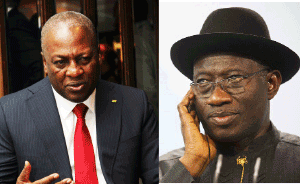Nigeria and Ghana appear ready to take their rightful place as the regional economic leaders through synergy that will see the two West African countries increasing their trade inflows. VICTOR EBIMOMI and MARY OGEDENGBE report…
Ghanain President, John Mahama with President Goodluck Jonathan of Nigeria
Nigeria and Ghana are bound in many ways. They both have historical similarity as products of same colonial master, Britain. The colonisation gave both countries, which share no common language, a means of easy communication. The two countries equally have had a robust relationship spanning many years. Though, occasionally, the relationship is punctuated for one reason or another.
As the first independent country in West Africa in 1957, then known as Gold Coast, and with flourishing economy, many Nigerians moved there to either stay or do business. But the relationship turned sour when the number of Nigerians began to shift the demography of the country and the people became somehow agitated. So the country promulgated a law known as Aliens Compliance Order of 1969, which forced many Nigerians and other migrants to leave Ghana as they made up 20 per cent of Ghana’s population at the time.
But when the economy nosedived in the 70s, thousands of Ghanaians migrated to Nigeria as economic refugees, involving in all sorts of menial trades. They were, however, later disappointed in 1983 during the military regime of Major General Muhammad Buhari when about one million of them were deported in what today is known as ‘Ghana Must Go’ episode.
The coming of General Ibrahim Babangida as Nigeria president on August 27, 1985 opened a new vista for a renewed Nigeria-Ghana relation that transcended the political to the economy. This was, however, made possible with the emergency of Flight Lieutenant Jerry John Rawlings, who had earlier taken over power in Ghana through a coup on June 4, 1979, and later killed some of the past leaders for mismanaging the country’s economy. He came on a state visit to Babangida and the action re-ignited the two countries’ brotherliness. Since then, both countries, which are now the two largest economies in West Africa, have been enjoying some levels of economic conviviality.
Nigeria’s high level of liquidity served as an important source of capital for Ghana. In fact, Nigeria was Ghana’s third most-important trade partner in 2010, accounting for almost 10 per cent of total Ghanaian foreign trade. Ghana, in turn, was Nigeria’s ninth-largest trade partner in the same year, accounting for some 1.3 per cent of Nigerian trade (including 1.9 per cent of exports). Many Nigerian companies have their presence in Ghana, thereby helping to boost its economy. For instance, Nigerian banks, entertainment and hospitality sectors have set up shops in Ghana, just as Globacom, Nigeria’s telecommunications giant, is a household name in the country.
However, mid-2012, the trade relationship between the two countries snapped, as the Ghana government began to enforce the 1994 Ghana Investment Promotion Centre Act, which mandates foreigners to employ a minimum of 10 Ghanaians and invest at least $300,000 in their business to act as traders in the country. Particularly, Nigerians doing business in the country could not tolerate what they perceived as ‘unbrotherly’ move. Expectedly since then, it has not been all rosy.
On Thursday, July 31, the two countries went a step further to cement their camaraderie, particularly with regard to increasing investments and trading in both countries. A programme tagged ‘Doing Business in Ghana’ was organised at the Henry Fajemirokun Hall of the Lagos Chamber of Commerce and Industry (LCCI) on Idowu Taylor Street, Victoria Island, Lagos. The event, which was facilitated by the Ghana-Nigeria Business Council, was primarily a sensitisation aimed at proffering ideas on how industries and governments can boost trade between Nigeria and Ghana as well as in the entire West Africa region. It was meant to encourage partnership and co-operation of the private sector among other things.
TheNiche gathered that the event was the culmination of series of efforts by the Nigeria High Commissioner to Ghana, Ambassador Ademola Oluseyi Onafowokan, and LCCI.
Before Ambassador Onafowokan resumed duty in Ghana as High Commissioner, he was said to have approached the President of LCCI, Remi Bello, to support him to improve on the trade relations between Nigeria and Ghana. Specifically, he requested that LCCI assists to nurture a bi-lateral business-related chamber or council between the two countries.
The committee that was formed then, comprising two council members of LCCI and others, worked assiduously to achieve this objective. So far, it has succeeded in registering the Ghana-Nigeria Business Council in Ghana, while that of Nigeria is still being tinkered with.
Those in attendance at the event, apart Ambassador Onafowokan who was the Special Guest of Honour, were the Minister of Trade and Industry, Ghana, Haruna Iddrissu; President of LCCI who was represented by his deputy, Mrs. Nike Akande; Director-General of LCCI, Seth Baah; the Managing Director of Access Bank, Ghana, Dolapo Ogundimu; and Bello.
Others were trustees of the council: Bambo Ademiluyi, Mrs Biola Ogunbiyi, Mrs. Sola Owonu and Reginald Larye.
Almost all those who spoke at the event emphasised the need for a flexible trade relations and urged members of the council to take up the mantle and help improve trade relations between both countries by advocating a developing policy and to also help remove all artificial barriers hindering industries from trading.
Iddrissu stated that Nigeria has had a long history of trade relations and called for its sustenance for the benefit of not only the two countries but the entire region. He promised that Ghana was ready to provide enabling environment for any investor ready to do business in the country, but added that their respective businesses must be registered with trading authorities in the country.
He maintained that “the trade relations between Nigeria and Ghana ought to be better and so the artificial barriers hindering this should be removed”.
Bello promised that since the two countries are now enjoying democracy, which easily attracts investors, they should leverage on it to build investment base between them.
He explained that the sensitisation forum was a platform to provide enlightenment on how to boost trade between Nigeria and Ghana in particular as well as West Africa as a whole, adding that integration of both countries is the main vehicle for boosting trade.
As for Onafowokan, the gathering was a window of opportunity for Nigerians to invest in Ghana, stressing that the relationship between the two countries has improved significantly.
In a brief encounter with TheNiche at the event, the envoy disclosed that the two countries were trying everything possible to improve on their trade relation.
“It is excellent. We are just trying to see what we can do to make it even better; to boost the trade. But as you want to know, Nigeria is Ghana’s biggest trading partner. However, the volume of trade still has the potential of growing bigger, and we still need to do more statistics on tertiary trade; that is, the everyday trade across the border that is unrecorded. But aside that, it is excellent,” he said when asked about the relations between the two countries.
He assured that if there are authentications of Ghana products coming into Nigeria, there would be no inhibition.
“There are lots of things that we can do. If, for instance, we get more authentications of Ghanaian products that are coming to Nigeria, Ghana can bring in more products into Nigeria. Do not forget that Nigeria is doing great business in Ghana; we have over six banks, all the key insurance companies, big real estates and so many things going on between the two countries. But Ghana sends a little more to Nigeria,” he said.
“So what we are looking at is a way to make the trade on both sides balanced, whereby Ghanaians will come to Nigeria more like Casapreco and the rest of them, but also try and eliminate goods from other companies that are not Ghana-based, repackaged and then dumped into Nigeria. That is where a bit of grouse is. Otherwise, we have a perfect economic, political and especially trade relationship.”
Onafowokan hinted that there could be a bilateral treaty not only to facilitate businesses between both countries but to protect the products of each of the countries.
“We are working on it. Ghana has submitted a draft and we are looking at it critically. I am sure sooner than later, the agreement will be returned to Ghana and it will protect property and investments on both sides,” he said.
Onafowokan dispelled the rumour that the Ghanaian authorities are somehow unfriendly to Nigerian traders wishing to do business in the country, explaining that what the country is doing is in line with its policy of legalisation of every business.
“The Ghanaian authorities welcome Nigerian traders who are there in their droves. I know them, I know their president, and they are many all over Ghana. There is hardly any Ghanaian town that is big enough that you will not find selling or trading. What the Ghanaian government is saying is just that people should regularise their sale and register their businesses in accordance with the Ghanaian law and the ECOWAS (Economic Community of West African States) full trade treaty, but not that they are not welcome. A few individuals misguided have taken actions that are not just, and thank God the Ghanaian government has taken decisive steps to make sure that this is corrected,” he said.
In his opinion, Ghana was not doing anything that was out of this world in tariff and tax regimes, as other countries, including Nigeria, also have theirs.
The diplomat, however, maintained that if Ghana does anything that is far from the normal expectation and norm, Nigeria will not hesitate to call their attention to it through the appropriate channel.
“We in Nigeria charge those levies and tariffs too; but most of these things are reciprocal. If Ghana does a wrong thing, I think Nigeria will call their attention to it and we will find a way to mend fences. Do not forget that we have ECOWAS that has laid down some rules which cannot be violated, and which sometimes supersedes the national one. In the recent meeting they had, most of these things were resolved and before long we will start seeing changes,” he assured.
In what can be described as a wake-up call to African countries, President of the United States of America (U.S.), Barack Obama, on Tuesday, August 5, charged them to do more to expand trade on the continent and try to empower women and the youths by giving them enduring environment.
Obama, who spoke while lecturing them as primary school pupils during the U.S.-African Leaders’ Summit, emphasised the need for infrastructural development, especially electricity, even as he promised the continent $7 billion to promote trade with Africa.
He said the target was to ensure that there is provision of electricity that will cover 60 million African businesses, noting that Africa has a great market potential which is the reason U.S. is partnering with it to build trade relationship.
According to Obama ‘’there is the need to particularly empower young African entrepreneurs who will in turn create jobs and opportunities not only for now but for future generations’’.













